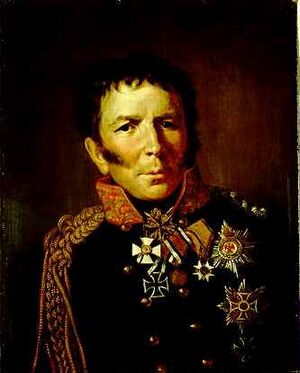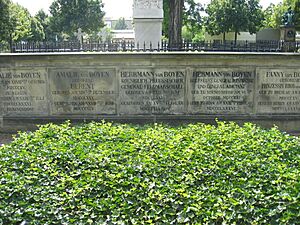Hermann von Boyen facts for kids
Quick facts for kids
Hermann von Boyen
|
|
|---|---|
 |
|
| Born |
Hermann von Boyen
20 June 1771 |
| Died | 15 February 1848 (aged 76) |
Leopold Hermann Ludwig von Boyen (born June 20, 1771 – died February 15, 1848) was an important Prussian army officer. He played a big part in changing and improving the Prussian Army in the early 1800s. He also worked as the Minister of War for Prussia. This means he was in charge of the army's administration and planning. He held this job from 1810 to 1813, and again from 1841 to 1847.
Contents
Hermann von Boyen: A Prussian Reformer
Early Life and Military Beginnings
Hermann von Boyen was born in a place called Kreuzburg (which is now Slavskoye, Russia) in East Prussia. He joined the army in 1784 when he was just 13 years old. This was in the city of Königsberg.
In 1788, Boyen became a second lieutenant. He started working at the military academy in Königsberg. While there, he even attended some lessons given by the famous thinker Immanuel Kant.
Helping to Reshape the Army
From 1794 to 1796, Boyen took part in the Polish campaign. He worked as an assistant to General von Günther. In 1799, he was promoted to captain.
In 1806, he served in a war on the staff of the Duke of Brunswick. Boyen was hurt during the Battle of Auerstädt in October 1806. After the Treaty of Tilsit in 1807, he became a major. He then joined a special group led by Gerhard von Scharnhorst. This group was tasked with reorganizing and improving the Prussian military.
By 1810, Boyen was in charge of the Military Cabinet. He was Scharnhorst's most dedicated helper in rebuilding the Prussian army. However, when Prussia made an alliance with France in 1812, Boyen resigned from his position as a colonel. He then traveled to Vienna and St. Petersburg.
Return to Service and War Minister
In 1813, Boyen was called back to serve Prussia. As a colonel, he joined the Russian army on its way to Saxony. After the Battle of Lützen in May 1813, he was put in charge of border guards. Later, he was responsible for defending Berlin.
During a break in the fighting, King Frederick William III made him Chief of General Staff for the 3rd Army Corps. In this role, Boyen took part in many battles in 1813 and 1814. He was then promoted to major-general.
After the first Peace of Paris in May 1814, Boyen became the War Minister. He finished setting up the Landwehr reserve. This was a system where ordinary citizens could be called upon to serve in the army if needed. In 1818, he became a lieutenant general.
Boyen tried hard to protect the Landwehr system. But he faced strong opposition from people who wanted to change it. He resigned in 1819.
For 21 years, Boyen lived a quiet life. He spent his time studying history. Then, King Frederick William IV became king. He immediately asked Boyen to return to active service. Boyen was promoted to general of the infantry.
In March 1841, he became War Minister again. However, he did not have as much influence on politics this time. He resigned in November 1847. He was given the highest military rank, field marshal. Hermann von Boyen passed away on February 15, 1848. The King named a fortress in East Prussia, Lötzen, after him.
Boyen's son, also named Hermann von Boyen, was an important assistant to the King. He later retired as the governor of Berlin in 1879. Hermann von Boyen was buried at the Invalidenfriedhof Cemetery in Berlin. A former football club, Yorck Boyen Insterburg, was named in his honor.
His Writings and Legacy
Hermann von Boyen wrote several books and papers. These included:
- Beiträge zur Kenntnis des Generals v. Scharnhorst (1833) – This book shared his knowledge about General von Scharnhorst.
- Erinnerungen aus dem Leben des Generalleutnants v. Günther (1834) – This was a collection of memories from the life of Lieutenant General von Günther.
- Kampagne-Journal der Jahre 1793 und 1794 (1796) – This was a journal about his experiences during military campaigns.
He also wrote a song called "Der Preußen Losung" in 1838.
 | Emma Amos |
 | Edward Mitchell Bannister |
 | Larry D. Alexander |
 | Ernie Barnes |


